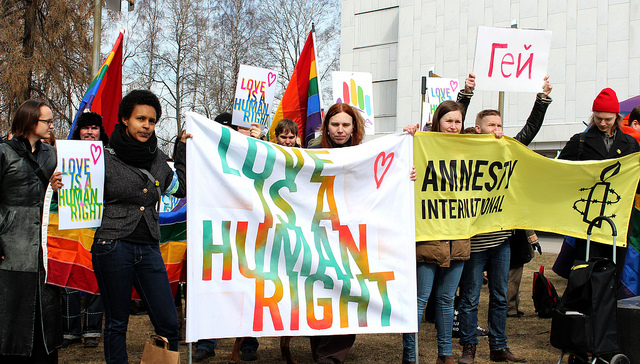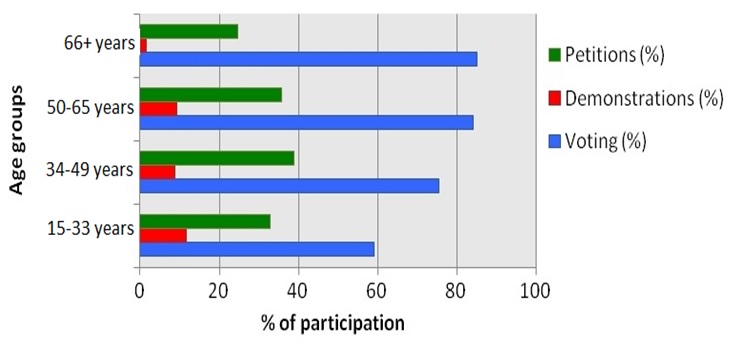Evidence from Britain, France and Germany shows young people are engaged in more direct forms of political participation, beyond voting
Young people are much less likely to vote in elections that older generations, with the age gap in voting much higher in the UK than in other advanced democracies. Daniela F Melo and Daniel Stockemer present findings from the UK, Germany and France that show young people are more likely than older people to be engaged in other forms of participation, such as political demonstrations.

Young people demonstrating against anti-gay laws in Russia. Credit: Amnesty Finland (CC BY-NC-SA 2.0)
In Western societies, younger voters have been the Achilles’ heel of conventional political participation. Decades of data gathering in the OECD have shown that “voter turnout tends to increase monolithically with age.” In fact, ‘getting the young vote’ is one of the herculean tasks of politicians, seldom achieving substantial rates of success.
While young adults are a base that is unlikely to participate in conventional ways, it is less clear if young adults generally participate less in the political process, or if they are engaged in different – perhaps more unconventional – forms of political action. Furthermore, a perhaps excessive fascination with the unconventional engagement of the younger generations, and the conventional voting patterns of the elderly, has resulted in a dearth of studies that take into account how adults between the ages of 34-65 engage politically. In our study, we seek to paint a broader picture of political engagement by comparing all age groups in terms of conventional and unconventional forms of participation.
Political engagement is often categorized as either conventional or unconventional. Conventional political participation includes actions that take place through institutionalized means, such as voting, campaigning or joining a party. Conversely, unconventional political participation comprises instances of political behavior that are extra-institutional. Some common expressions of this type of politics include sit-ins, boycotts, sabotage, petitions, happenings, unauthorized uses of public space for protests, demonstrations and marches, among others.
Focusing on the United Kingdom, Germany, and France, we evaluated the influence of age on voting, demonstrating, and petitioning. Petitions and protest are tools for the voicing of grievances, as well as to call attention to issues that are often neglected by the elites. Voting, on the other hand, can be understood as acquiescent and/or supportive participation, at least from an institutional standpoint. These various forms of political participation have differing logics, thus various age cohorts might be more attuned to participate in either conventional or unconventional activities. We hypothesize that age can be a strong predictor of variation in participation levels between these three forms of political engagement.
We differentiate between four age cohorts: young adults (ages 15-33), adults (34-49), middle-aged (50-65), and elderly (66 and older). Applying several statistical techniques (e.g. descriptive statistics and logistic regression analyses) on data from the European Social Survey (ESS), we find substantive differences in the preferred mode of political participation across various age cohorts.
As expected, we confirm the hypothesis that young adults participate less in conventional ways, such as voting, when compared to the older generations. In fact, our sample (see figure 1) indicates that there is a 20 percentage-point gap in self-reported voting between young adults and the elderly.
The engagement patterns are starkly different when considering unconventional participation. When we measure participation in demonstrations, we find a negative relationship between ageing and this form of engagement. In other words, older individuals are substantively less likely to participate in demonstrations or, alternately, young adults drive participation in demonstrations. While one in every five young adults surveyed participated in at least one demonstration, the number drops to 1/7 for the groups between 34-65, and to a striking 1/13 among the elderly.
Engagement in petition signing presents a more nuanced picture. We discover that adults between the ages of 34-65 have the highest likelihood of engaging in this form of political action. We also see that for young adults and the elderly petition-signing activities are less pronounced than for individuals in the 34-65 age groups.
Figure 1: Relationship between Age and various forms of political engagement in Germany, France, and the United Kingdom
Our findings cast doubts on claims that depict the declining electoral participation of young adults as evidence of political apathy (see for instance the work of Putnam, Jowell and Park, or Macedo et al). While it is true that younger generations of German, French and British citizens are turning away from the electoral booth in greater numbers, they nonetheless are engaged in forms of direct action. Compared to older citizens, the younger cohorts are more than twice as likely to participate in a demonstration and more likely to sign a petition.
Furthermore, our findings lend some support for Inglehart’s value-change approach and the new social-movement literature. It is plausible that with the fulfilment of material needs and the extension of political rights in post-modern societies, the politically-active youth is more prone to seeking self-realization and the advancement of political goals through unconventional participation.
—
This post is adapted from the article, Melo, Daniela &Stockemer, Daniel. 2014. “Age and Political Participation in Germany, France and the U.K.: A Comparative Analysis,” Comparative European Politics 12 (1): 33-53
Note: This post represents the views of the authors, and does not necessarily give the position of Democratic Audit or the LSE. Please read our comments policy before commenting. Shortlink for this post: buff.ly/1gz2a01
—
 |
Daniela F. Melo is currently a Visiting Instructor of Government & International Relations at Connecticut College. |
 |
Daniel Stockemer is a Visiting Professor of Political Science at the University of Ottawa. |






 Democratic Audit's core funding is provided by the Joseph Rowntree Charitable Trust. Additional funding is provided by the London School of Economics.
Democratic Audit's core funding is provided by the Joseph Rowntree Charitable Trust. Additional funding is provided by the London School of Economics.
More evidence the kids are alright-its unchecked media & corporate power that’s the problem https://t.co/o60Jg25pmx #BeyondApathy #democracy
Young people in France,UK &Germany more likely to direct participation in political life,not voting though https://t.co/RCERHd8zK2 #eyc2014
Evidence from Britain, France and Germany shows young people are engaged in more direct forms of… https://t.co/j966NeUKNO
Evidence from Britain, France and Germany shows young people are engaged in more direct forms of political parti… https://t.co/2xx7DROMu3
In the UK, France & Germany young people engage in more direct forms of political participation, going beyond voting https://t.co/czKB6BKJzU
Evidence from Britain, France & Germany shows young people engaged in more direct forms of political participation https://t.co/WBSv7vrqdi
Evidence from Britain, France and Germany shows young people are engaged in more direct forms of political… https://t.co/azOSN0VTZi